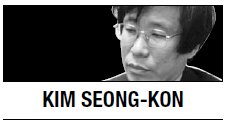Due to the severe worldwide economic recession, it seems to be extremely difficult to get a decent job these days virtually everywhere in the world. A few weeks ago, LTI Korea, of which I am president, advertized a job opening. To my surprise, 179 highly-qualified college graduates submitted applications for one opening and all of them exhibited stellar resumes such as a 940-960 TOEIC scores, a 3.8 GPA, ample overseas experience, and a B.A. or an M.A. from a top university. It was heartbreaking to decline 178 competent applicants, but what else could I do?

The same goes for the United States. As the job market is no longer rosy, I hear that quite a few American college graduates are now entering graduate school, hoping to become a professor in the future. Since there is no mandatory retirement for American professors, being a college professor can be attractive for young Americans to be sure.
However, it is not easy to become a professor either. Once you enter graduate school, you need to spend at least five to six years to earn a Ph.D. But that is not all. When there is an opening at a major American university, usually 100 or 200 Ph.D.s apply these days. That means, even holding a doctorate, there is still no guarantee that you will be able to become a professor.
That is why graduate school is less popular than before in Korea. College students seem to think, “What’s the use of entering a graduate school, if you have to spend so many years to receive a Ph.D. and yet, your future is highly nebulous?” Despite your time and energy, indeed, there is a strong chance a doctor of philosophy may end up being a part-time instructor forever. The universal rule, “You reap what you sow” does not seem to apply to becoming a professor. Who would take the risk, then, if investing in higher education is as unstable and risky as investing in stocks?
In the past, the most popular jobs were professional ones such as doctors, lawyers and professors. Today, however, Koreans prefer the ones that can guarantee long-term security such as government officials, secondary school teachers and college staff members. Those jobs are called, “god-given jobs,” because, unlike company jobs which force you to retire in your early 50s, they guarantee that you will be able to continue until 60.
Notwithstanding the depressing worldwide phenomenon, it still is our government’s responsibility to provide jobs for future generations. For that reason, our politicians should encourage big corporations such as Samsung, LG or Hyundai to create more jobs for college graduates, instead of condemning them as if they were the source of all evil in our society. The more government tries to criticize and regulate them, the more will they shrink, not being able or willing to expand their business and hire more people. Yet, our political leaders unanimously condemn the big corporations under the name of “economic democracy.”
It is also regrettable that our political leaders have spent huge sums of money on arguably less compelling projects such as aiding North Korea, dispersing government institutions to local cities, or building canals. It would have been much better if they had spent the astronomical amount of money in creating more jobs for our unemployed young people instead. While so many young people are jobless nowadays, nobody seems to take the responsibility.
As getting a job has become everybody’s ultimate concern, NBC recently reported a list of top jobs and worst jobs. According to the list, all the top jobs are computer-related ones such as software engineer, actuary, statistician, computer systems analyst and mathematician. As the world has been increasingly going digital, and Web applications as well as cloud computing are emerging as newly thriving industries, computer-related jobs have become people’s favorite. The problem is that you have to be a computer whiz to get one of these jobs.
On the other hand, the worst jobs have something to do with manual labor, such as ironworker, lumberjack, roofer and taxi driver. These jobs require a long training period to acquire the skills and are constantly exposed to accidents and injuries.
In Korea, we, too, have the so-called 3-D (Difficult, Dirty, Dangerous) jobs that college graduates tend to shun, which therefore have had to be filled with foreign workers. About 80 percent of high school graduates enter college in Korea, and when they graduate, they look for high-paying, white-collar jobs only. Since our presidential candidates promise half-price college tuition in unison, the unemployment situation will worsen as the number of students entering college increases.
The need to create jobs surely outweighs people’s demand for social welfare or any other seemingly urgent matters. What shall we do with the numerous jobless in our society? We should give hope to those hopelessly unemployed young people.
By Kim Seong-kon
Kim Seong-kon is a professor of English at Seoul National University and president of the Literature Translation Institute of Korea. ― Ed.








